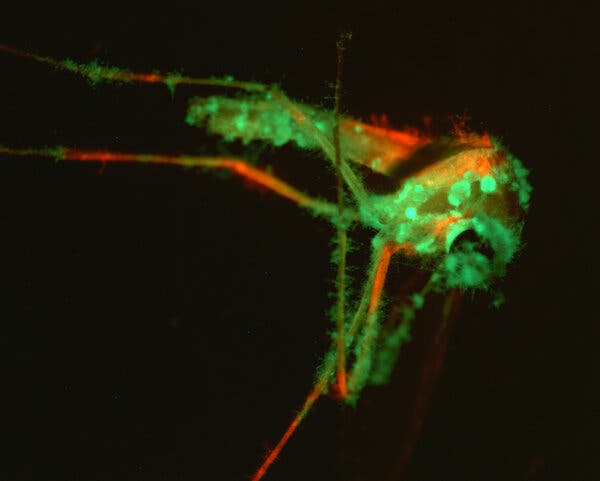Science
Genetically Engineered Fungus Offers Innovative Mosquito Control Solution

A new form of mosquito control has emerged, potentially revolutionizing efforts to combat these deadly pests. Researchers have developed a genetically engineered version of the fungus Metarhizium, which can produce a sweet-smelling substance that attracts mosquitoes. This innovative approach could offer an affordable and environmentally friendly alternative to traditional chemical methods.
Published in the journal Nature Microbiology, the study details how this engineered fungus lured mosquitoes into traps, resulting in a remarkable kill rate of between 90 percent and 100 percent in laboratory experiments. The scientists believe this method could significantly reduce mosquito populations, which are responsible for the spread of severe diseases such as malaria and dengue.
According to Noah Rose, a biologist specializing in mosquito-borne disease transmission at the University of California San Diego, this research exemplifies a fusion of classic biological control strategies with modern genetic technology. “This work is cool in that it puts together a classic biological control idea with a more modern high-tech approach,” he stated. Rose was not involved in the study but recognized its potential impact.
Mosquitoes are considered one of the most dangerous creatures on the planet, contributing to the infection of up to 700 million people annually and causing approximately 1 million deaths each year. Public health initiatives have relied on fumigation and pesticide-treated bed nets to manage mosquito populations. However, many mosquito species have developed resistance to these chemical interventions, necessitating the search for alternative solutions.
Emerging strategies are now leveraging biological methods to combat these resilient pests. Techniques include the introduction of Wolbachia bacteria to inhibit disease transmission and sterilization through radiation. The latest findings on the Metarhizium fungus add another tool to this growing arsenal.
This innovative research represents a significant step forward in the ongoing battle against mosquitoes. By harnessing the power of genetic engineering, scientists are exploring new avenues to protect public health and reduce the burden of mosquito-borne diseases. As the effectiveness of this fungus is validated through further studies, it may soon play a crucial role in global mosquito control efforts.
-

 Lifestyle3 months ago
Lifestyle3 months agoLibraries Challenge Rising E-Book Costs Amid Growing Demand
-

 Sports3 months ago
Sports3 months agoTyreek Hill Responds to Tua Tagovailoa’s Comments on Team Dynamics
-

 Sports3 months ago
Sports3 months agoLiverpool Secures Agreement to Sign Young Striker Will Wright
-

 Lifestyle3 months ago
Lifestyle3 months agoSave Your Split Tomatoes: Expert Tips for Gardeners
-

 Lifestyle3 months ago
Lifestyle3 months agoPrincess Beatrice’s Daughter Athena Joins Siblings at London Parade
-

 World3 months ago
World3 months agoWinter Storms Lash New South Wales with Snow, Flood Risks
-

 Science3 months ago
Science3 months agoTrump Administration Moves to Repeal Key Climate Regulation
-

 Business3 months ago
Business3 months agoSoFi Technologies Shares Slip 2% Following Insider Stock Sale
-

 Science2 months ago
Science2 months agoSan Francisco Hosts Unique Contest to Identify “Performative Males”
-

 Science3 months ago
Science3 months agoNew Tool Reveals Link Between Horse Coat Condition and Parasites
-

 Sports3 months ago
Sports3 months agoElon Musk Sculpture Travels From Utah to Yosemite National Park
-

 Science3 months ago
Science3 months agoNew Study Confirms Humans Transported Stonehenge Bluestones









